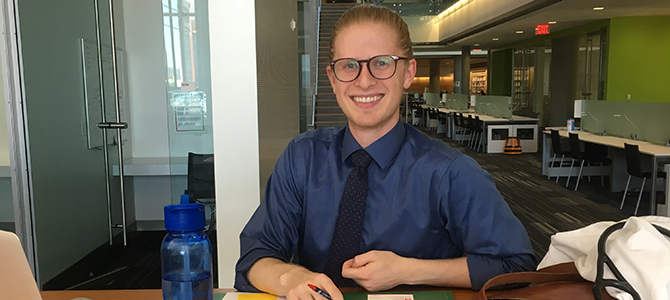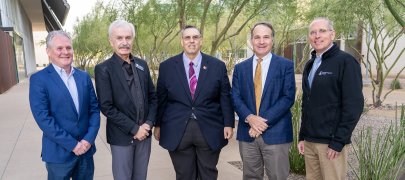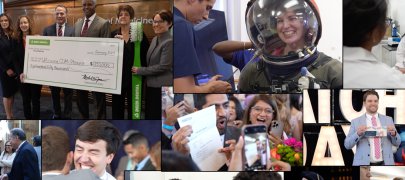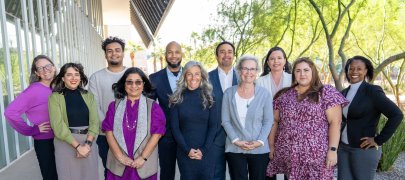
Student Profile: Dylan Sabb

As a second-year student at the University of Arizona College of Medicine – Phoenix, Dylan Sabb has learned to shift from the academic pace of first-year classes to gaining leadership experiences, research and committee work all while preparing for the first board exam, the USMLE Step 1.
Sabb is this year’s Community Health Initiative – Phoenix (CHIP) leader for the monthly Mini-Medical School program, which introduces the school and its students and faculty to the community through lectures about health care.
During his first year of medical school, Sabb participated as a volunteer for Mini-Medical School. This year, as student leader, he coordinates the medical student volunteers for the events and helps to come up with hands-on activities.
“I really liked the program,” he said. “I thought it was a really enjoyable way to interact with community members in the form of education.”
Sabb was born in Tucson, and moved to England during his middle school years.
He knew that he wanted to become a doctor and had originally intended to go to medical school in England.
“Their medical school itself is longer,” Sabb said of the education and training process in England. “They typically don’t go through a traditional undergraduate program and then medical school. They go through a longer schooling that is specifically for medicine.”
When it came time to enter high school, Sabb moved to Austin, Texas. Four years later he was off to North Carolina to attend Davidson College, where he pursued a pre-med track, majoring in biology and minoring in Hispanic Studies.
He said his choice of major was not a determining factor for medical school admission.
“I know people in my class that were English majors or economics majors,” he said. “It’s a little harder to gain some research or job experience while you’re an undergraduate student, especially if you’re doing a non-science major and a pre-med concentration. That fills up your schedule pretty quickly.”
Upon graduation, Sabb moved back to Tucson for two years where he worked in a hospital as a scribe.
“I was primarily one physician’s scribe in two different emergency departments,” he said. “I was getting work experience while also applying to medical school.”
Sabb planned to stay in Tucson for just one year, but he was not accepted into medical school on his first try, a familiar experience for many students.
“If you are taking time off, it’s a chance to prove yourself as different from other people, and it gives you something to talk about in interviews,” he said. “It’s quite normal for people to go through at least one or two rounds of application processes because there’s a lot of chance involved since everyone is a competitive applicant.”
Sabb reflected on his first year of medical school, saying he enjoyed it, but warned that he had to quickly adjust to the accelerated pace.
“The hardest part about medical school is the speed with which we move through material,” he said. “Expectations are high, testing is a frequent occurrence that you just have to get accustomed to.”
There is always pressure that comes with exams, but Saab said that at the UA Arizona College of Medicine – Phoenix, there is less emphasis on individual competition and greater significance on collaborative efforts to promote overall success.
“Our campus culture and the fact that we aren’t ranked academically for our first two years means that the focus is much more about supporting each other and getting through it and making sure that we are learning the material,” he said. “It’s much less of a competitive environment.”
Sabb said his routine changes with his school work, but with the help of the faculty and the student affairs staff, he has been able to redirect and manage. In addition to his involvement on Mini-Med, Sabb is one of two students members of the Office of Diversity and Inclusion’s Leadership Council.
“There’s a lot of emphasis from our student affairs side on maintaining or finding for yourself a practical work-life balance,” he said.”
In his estimation, it’s the student-focused environment and student-life emphasis that makes the college stand apart from other schools.
“You’re not going to see a whole lot of variety necessarily in the content that you get,” he said. “Most medical schools are all going to teach you the same basic things because that’s how they’re accredited. So it’s a lot of the other extraneous components to medical school that makes it unique.”
About the College
Founded in 2007, the University of Arizona College of Medicine – Phoenix inspires and trains exemplary physicians, scientists and leaders to optimize health and health care in Arizona and beyond. By cultivating collaborative research locally and globally, the college accelerates discovery in a number of critical areas — including cancer, stroke, traumatic brain injury and cardiovascular disease. Championed as a student-centric campus, the college has graduated more than 900 physicians, all of whom received exceptional training from nine clinical partners and more than 2,700 diverse faculty members. As the anchor to the Phoenix Bioscience Core, which is projected to have an economic impact of $3.1 billion by 2025, the college prides itself on engaging with the community, fostering education, inclusion, access and advocacy.


